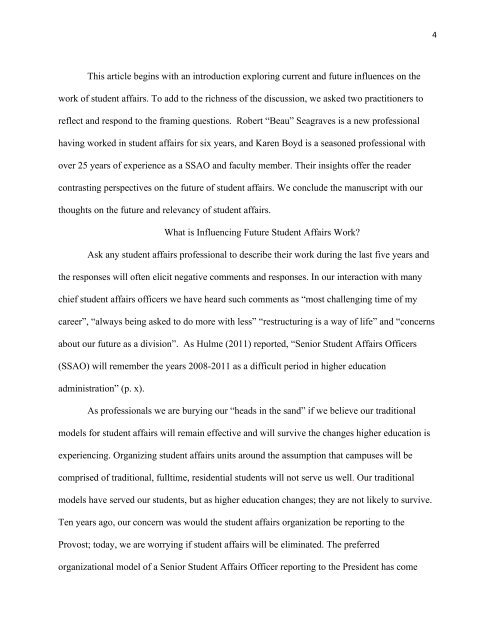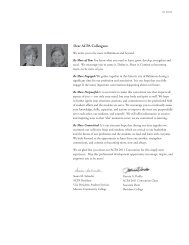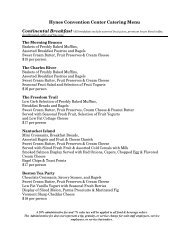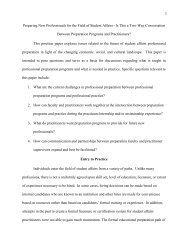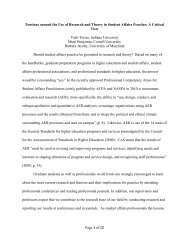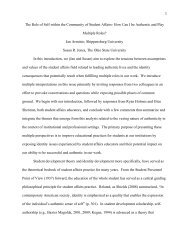Is Student Affairs Relevant for the 21st Century? Tony W. Cawthon ...
Is Student Affairs Relevant for the 21st Century? Tony W. Cawthon ...
Is Student Affairs Relevant for the 21st Century? Tony W. Cawthon ...
You also want an ePaper? Increase the reach of your titles
YUMPU automatically turns print PDFs into web optimized ePapers that Google loves.
This article begins with an introduction exploring current and future influences on <strong>the</strong><br />
work of student affairs. To add to <strong>the</strong> richness of <strong>the</strong> discussion, we asked two practitioners to<br />
reflect and respond to <strong>the</strong> framing questions. Robert “Beau” Seagraves is a new professional<br />
having worked in student affairs <strong>for</strong> six years, and Karen Boyd is a seasoned professional with<br />
over 25 years of experience as a SSAO and faculty member. Their insights offer <strong>the</strong> reader<br />
contrasting perspectives on <strong>the</strong> future of student affairs. We conclude <strong>the</strong> manuscript with our<br />
thoughts on <strong>the</strong> future and relevancy of student affairs.<br />
What is Influencing Future <strong>Student</strong> <strong>Affairs</strong> Work?<br />
Ask any student affairs professional to describe <strong>the</strong>ir work during <strong>the</strong> last five years and<br />
<strong>the</strong> responses will often elicit negative comments and responses. In our interaction with many<br />
chief student affairs officers we have heard such comments as “most challenging time of my<br />
career”, “always being asked to do more with less” “restructuring is a way of life” and “concerns<br />
about our future as a division”. As Hulme (2011) reported, “Senior <strong>Student</strong> <strong>Affairs</strong> Officers<br />
(SSAO) will remember <strong>the</strong> years 2008-2011 as a difficult period in higher education<br />
administration” (p. x).<br />
As professionals we are burying our “heads in <strong>the</strong> sand” if we believe our traditional<br />
models <strong>for</strong> student affairs will remain effective and will survive <strong>the</strong> changes higher education is<br />
experiencing. Organizing student affairs units around <strong>the</strong> assumption that campuses will be<br />
comprised of traditional, fulltime, residential students will not serve us well. Our traditional<br />
models have served our students, but as higher education changes; <strong>the</strong>y are not likely to survive.<br />
Ten years ago, our concern was would <strong>the</strong> student affairs organization be reporting to <strong>the</strong><br />
Provost; today, we are worrying if student affairs will be eliminated. The preferred<br />
organizational model of a Senior <strong>Student</strong> <strong>Affairs</strong> Officer reporting to <strong>the</strong> President has come<br />
4


